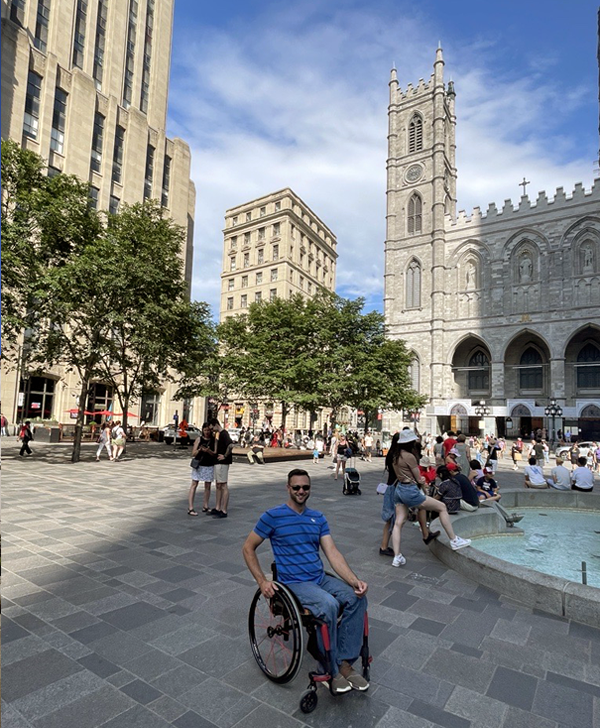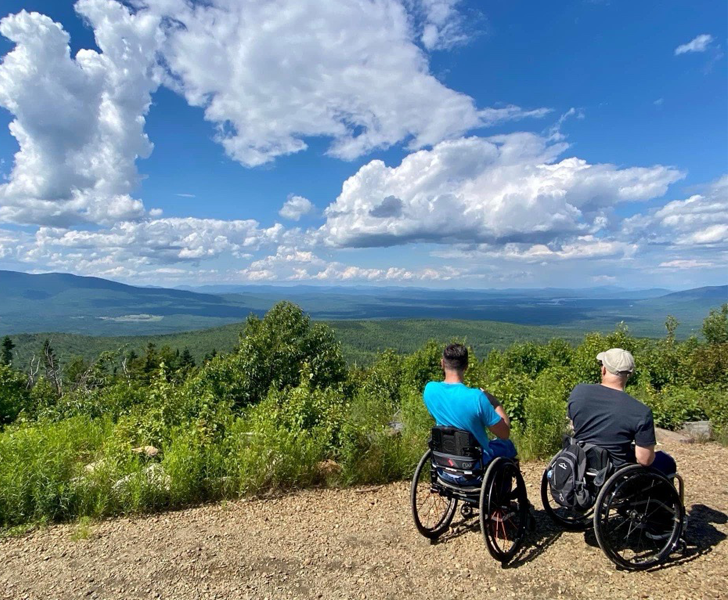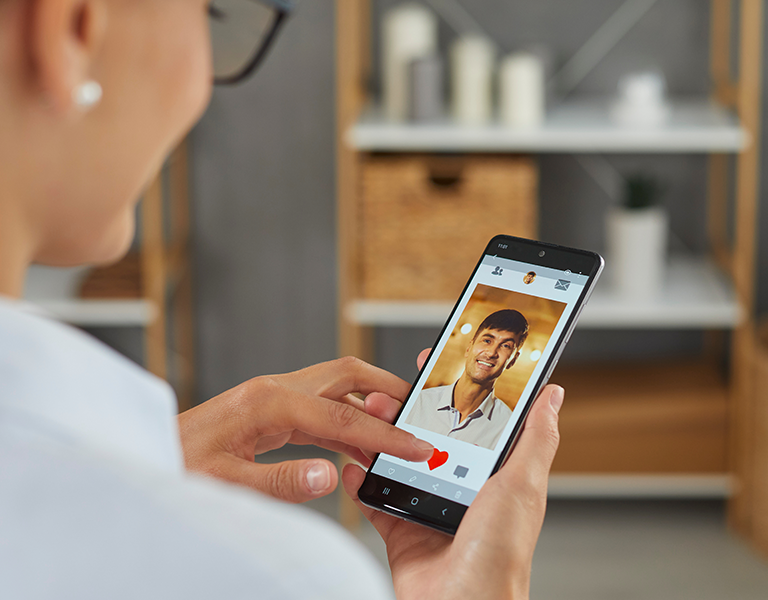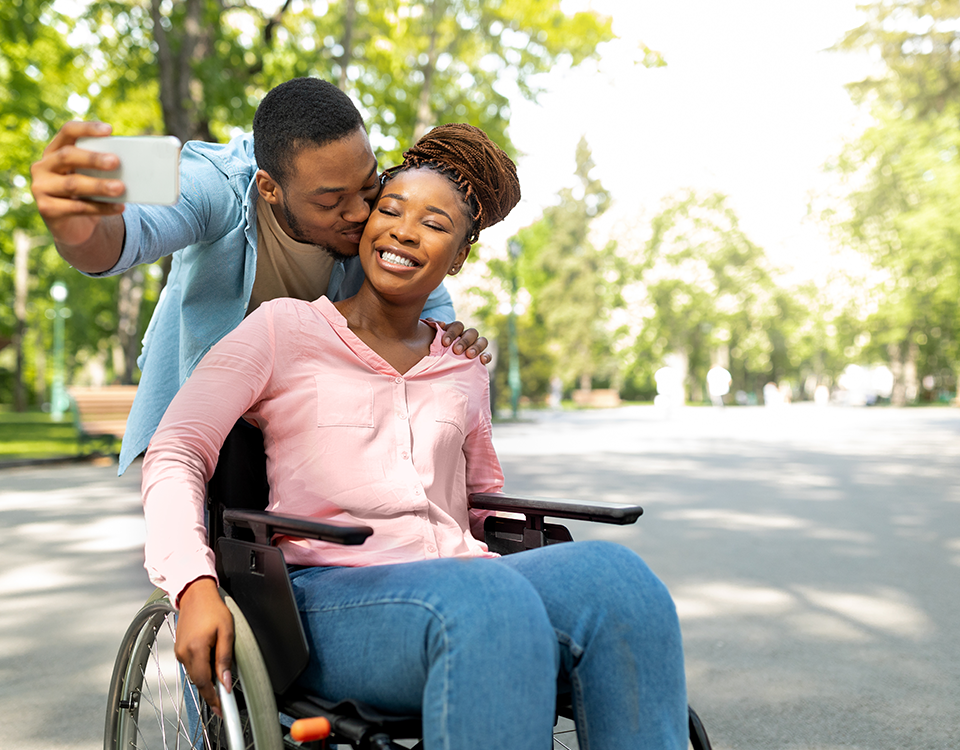Dating as a Wheelchair User: Breaking Down Assumptions and Stereotypes
Happy Valentine’s Day! Today is a day all about love. The one day a year that we surround ourselves in pink and red balloons and we express our feelings to our loved ones.
Happy Valentine’s Day! Today is a day all about love. The one day a year that we surround ourselves in pink and red balloons and we express our feelings to our loved ones.
Love is universal. It is something that everyone seeks, feels, and deserves to experience every single day. Love is not a foreign concept for people with disabilities; however, the stereotypes surrounding disabilities can sometimes get in the way.
This year, we decided to do something different, and instead of talking to you about an epic love story, we want to introduce you to the world of dating as a wheelchair user. For this purpose, our good friend and US Territory Sales Manager for Northern New England, Chris Collin, joins us for a fun and interesting conversation at which we strive to break down assumptions and stereotypes about dating a wheelchair user.
Chris is a T5 Paraplegic who got injured back in 2008, when he was only 22 years old. His world changed overnight and although dating was not his priority at the beginning, eventually he decided to introduce himself into the dating world.
Interview:
Chris Collin: Looking back, it’s been a while. I think getting injured at 22 shaped how I saw dating compared to someone who might go through it later in life, like in their 30s or 40s. At first, I was just focused on my own recovery, but eventually, I got back into the dating scene, which for me meant a lot of time in bars. Honestly, that probably made things easier—liquid courage has a way of making everyone a little bolder (laughs).
I didn’t have a ton of apprehensions around dating, but I guess my biggest fear was “would people see my chair as a problem?”
CC: Oh yeah, definitely. I see myself differently now than I did before. I used to always think of myself as someone with a disability, but that’s not really how I see it anymore. Over time, I’ve realized that a lot of people don’t really see me as “the person in a wheelchair.” Sure, they might notice it at first, but I’ve had family and friends actually forget I’m in a chair. And I’m like, “Wait, how do you forget? It’s literally right there!” But I guess it just fades into the background for a lot of people. That shift in perspective changed how I see myself, and in a way, it also shaped my dating life.
CC: No, I don’t think it really affects who I am. It’s more about the activities and the way things are done—like going on dates and getting around the community. That’s where the impact is. But as a person, I’m still the same. I still have the same emotions, the same personality—that part hasn’t changed. Of course, I’ve matured over time, which is a good thing (laughs), but at my core, I’m still me.

Chris traveling in Montreal
CC: Yeah, for sure. The places you’ve already been and the things you’ve done are familiar, so that makes it easier. But when I’m trying to find somewhere new, Google Maps is my best friend.
A lot of times, when you type in an address or a place, it shows you a Street View and even pictures that people have posted. You can get a pretty good idea of what the accessibility is like just by looking through those. If I still need more info, I’ll call the place directly to make sure there’s a way in or any accommodations available. Google Maps is definitely my go-to tool!
CC: Yeah, I think the biggest misconception is that people assume there are a lot of restrictions on what I can do or where I can go. And sure, that might vary from person to person, but I’m a really active person, and I’ve learned to navigate things in ways that others might not expect. I always believe there’s a way to make something work. If there’s a set of stairs in the way, there’s always a way around it—whether I figure it out myself or get a little help. I think a lot of people have this mental barrier of wondering, “What can he do?” or “What can we even do together?” But every time I’ve gone on a date, I’ve had people say, “Wow, I never thought you’d be able to do that!” It’s just a stigma—a mindset that limits possibilities before even trying. There’s always an out-of-the-box way to approach a situation, and I think that’s the biggest thing people should realize.
 Chris with a friend on Quill Hill (Maine).
Chris with a friend on Quill Hill (Maine).
CC: Yes, probably too many (laughs). And they all start to feel the same after a while—annoying and repetitive.
CC: When I first started using dating apps, I just picked pictures where I thought I looked good and threw them up. But over time, I realized I needed to be more strategic. I made sure my first photo clearly showed me in my wheelchair so there was no confusion—no swiping right on just a face picture, only for them to later realize I use a wheelchair and then instantly unmatch. That kind of rejection sucked, so I decided to be upfront about it.
At first, my mindset was, “I am who I am, my wheelchair doesn’t define me,” and while that’s true, I had to start looking at it from other people’s perspectives. Some people might see my wheelchair as a dealbreaker, and that’s okay. I wouldn’t want to start something with someone who has that mindset anyway—that’s not the kind of person I want in my life. So, I changed my approach.
I made sure my first picture showed me in my chair, and the rest of my profile highlighted the things I love, like doing sports, hanging out with friends, going to restaurants and bars. I wanted to make it clear that my wheelchair doesn’t limit me. And really, it all ties back to that common stigma: “What would we even be able to do on a date?” Showing my active lifestyle right away helps break that mindset. As a wheelchair user, I think it’s important to put in extra effort to shape how people perceive you before they even meet you. It’s not about changing who you are—it’s about making sure your profile represents you fully, so the right people swipe for the right reasons. It’s all psychology.
CC: Yeah, I think at the end of the day, they can be. But after all, we need to remember that dating apps are all about visuals. The first thing people see is your pictures, and if they’re not engaging or eye-catching, you’re probably not going to get as many matches. That goes for everyone, not just people with disabilities.
If your photos aren’t visually appealing, people are more likely to swipe left—it’s just how these apps work. So, the key is figuring out how to stand out and make your profile more enticing. There are a lot of blogs, videos, and tips out there on how to make a dating profile more effective, and honestly, I’d encourage people to check them out. I’m not naturally great at this stuff, so I had to do some research to understand why some people get better results than others. It all comes down to psychology—how people process visuals and make split-second decisions. A good trick is to think about what catches your own attention when swiping through profiles, then use that same strategy for yourself. If something stands out to you, chances are, it’ll stand out to someone else too.
CC: Yeah, for sure. Early on, I realized that my wheelchair could be a problem for some people—not because of me, but because of their own misconceptions. When I first started using dating apps, I mostly posted torso shots and didn’t really show my wheelchair. But then I noticed that when we met in person, some people were caught off guard. Or maybe they only saw one picture with my chair and didn’t really pay attention to it. I learned pretty quickly that it’s better to be upfront about it. A lot of people don’t have wheelchair users in their lives, and if they do, that person is probably different from me anyway.
A big part of overcoming that bias comes down to conversation. If you’re not comfortable talking about your disability, it can make things awkward. People naturally have questions when they see a wheelchair, but they might hesitate to ask because they don’t want to offend you. That’s why being open and making it clear that you’re cool with those conversations helps a lot. If you can create an easygoing vibe and let them know they can ask whatever’s on their mind, things tend to progress more smoothly.
CC: Yes, all the time. Early on, when I first started using dating apps, I noticed that the conversation would almost immediately jump to questions about sexual function. At first, I was taken aback, like, “Wow, why would you ask that so quickly?” But it happened so often that eventually, I started having fun with it—being playful, messing around, and coming up with different lines just to throw people off. After a while, it just became comical. I realized I was comfortable talking about it, so I didn’t mind being upfront.
That said, how someone asks makes a huge difference. If they’re rude or way too blunt, it’s an instant turnoff. But if they’re genuinely curious and respectful, I don’t mind the conversation. Timing also plays a big role—sometimes, people don’t even say hello before dropping a question like that. I’ve had opening lines where I’m just like, “Wow… at least buy me a coffee first.” (laughs).
CC: Be open to the process. That’s probably the biggest piece of advice I’d give. I wasn’t really keen on trying online dating at first, but it became the only option when I realized I wasn’t meeting the kind of people I wanted to meet in person. The places I was going just weren’t working, and I was too busy to find someone the old-fashioned way. So, I gave online dating a shot, but then got frustrated and stepped away, only to come back and try again. It’s all part of the process.
If you haven’t tried it yet, keep an open mind and just give it a shot. Don’t let a few bad experiences discourage you from sticking with it. If it doesn’t work at first, step back for a bit, and then come back to it later. Over time, you’ll figure things out—it’s a learning experience. You get to know yourself better, figure out how the app works, and just keep at it. It may take some time, but eventually, it’ll evolve into something better for you. That’s the biggest takeaway I’d share.
I can say from experience that it works! I met my partner on a dating app, and at first, we talked for a few days before the conversation tapered off. After about a week, I decided to reach out with a simple message letting her know I was still interested and wanted to keep talking, with the intention of meeting in person. That wasn’t something I’d usually do, but something kept nudging me to put it out there—to be upfront about what I felt and what I wanted. If I hadn’t done that, we wouldn’t be together today.
It’s all about putting yourself out there and sometimes giving things a second chance. I won’t speak for her, but I can say that when we finally met in person, the energy between us was incredible—something we never could have gotten just from texting. So, if you ever feel like the apps are letting you down, just remember there are people out there with the same kind heart as you, and you’re bound to find them.
We want to thank Chris for taking the time to meet with us and provide us all with insights that we hope will shed some light on what it is like to date in the 21st century as a wheelchair user.
If you are still looking for your soulmate, don’t be discouraged. Online dating can be intimidating, but it can work! Chris himself is in a happy and loving relationship that started with just a swipe to the right!
